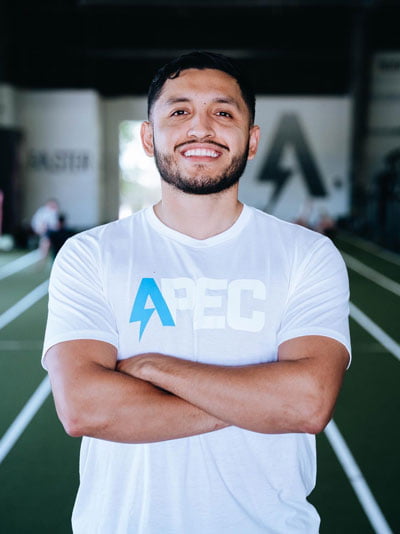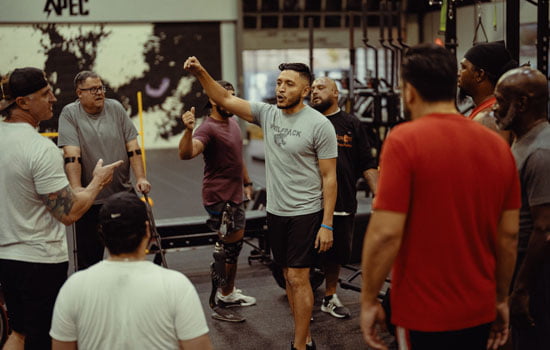Anthony Angulo ('22 BS, Exercise Science)

Tell us about yourself.
I was born in Waco, Texas, and moved several times across Texas and Oklahoma until Fort Worth became home. This is where I met my wife and lifetime friends. After finishing my tenure at UTA, I became a first-generation graduate and started working at a top performance training facility in Fort Worth. Currently, I work at APEC Performance Training, where I have the opportunity to work with diverse populations, including youth and professional athletes, adults in fitness, rehabilitation patients, and members of the adaptive community, such as amputees, neurodivergent individuals, those with spinal cord injuries, etc.
Why did you choose to attend UTA?
I chose UTA as it was cost-efficient for a quality education and close to home. I was able to continue my studies and work a full-time job as there was flexibility with my schedule. Also, it was an opportunity to network and develop relationships with my peers and professors.
What did you study at UTA? What attracted you to that field?
I studied exercise science with the aspiration of becoming a physical therapist. However, I discovered human performance training at a facility called APEC. Instantly I knew it was the field I wanted to pursue! It fascinated me because movement serves as a form of medicine. Exercise encompasses numerous benefits that can aid society in combating preventable diseases. I have always been captivated by how movement can assist individuals overcoming the challenges they face.
Describe your UTA experience. How did UTA help prepare you for your career?
I had a unique experience during the time of COVID, necessitating adjustments for protocols. Initially, I was worried because the field was eliminating the in-person aspect. However, UTA adapted with a hybrid approach, fitting well into my schedule. I appreciated the hybrid model, enabling me to learn at home and apply in person on our lab days. I've integrated a hybrid model into my career, utilizing our training app and combining it with in-person training to create the ultimate training experience.
Describe your path to your current position. What have you learned along the way?
At APEC, I fill multiple roles: I am the patient experience coordinator for our medical side, a performance trainer for our performance fitness sector, and the regional coordinator for the Adaptive Foundation. I consider myself fortunate to work in a field I am passionate about, even though the path was unconventional. My career spans various industries, including the luxury automotive sector, logistics and delivery, and physical therapy. What I've learned is the importance of adaptability in every environment. Much like our bodies, to facilitate growth, we need to subject ourselves to adaptations. I embraced adaptability, even when it wasn't in the field I initially aspired to be in. My goal was to develop a diverse skill set that I could later apply to the field I am truly passionate about — building a bridge between rehabilitation and performance through fitness.
"Learn to adapt, as you are going to face obstacles. But remember, you can change the plan to still reach your goals."
What drew you to performance training? Can you share any defining moments in your career that inspired you to continue your work?
"Performance," it signifies the action or process of carrying out or accomplishing tasks and functions, a concept I often discuss with our community. While we may focus on training athletes (youth and professional), I had to be creative in defining an athlete. To me, an athlete adapts to health, leadership, endurance, triumph, and excellence (A.T.H.L.E.T.E.), characteristics that individuals can develop.
Working with diverse athletes is what makes my career enjoyable. Through the Adaptive Foundation, we initiated the Adaptive Amputee Program at APEC. I have the privilege of training an amputee community toward their fitness goals. These individuals are the true inspiration of fitness and performance training, proving that amputation does not limit their capacity for physical achievement.
What's one lesson you learned at UTA that has stayed with you still today?
I learned to become adaptable in my environments. It helped me embody the transformative power to gracefully navigate challenges, fostering resilience, embracing change, and inspiring individuals to evolve and thrive in any circumstance.

What message do you have for the next generation of UTA graduates?
There are three messages I would like to share that I learned over time from books and mentors.
1. Learn to think like a farmer; plant the seeds of opportunities and connections. Nurture your seeds, as you can’t control the seasons or weather, but have faith in your goals.
2. Learn to adapt, as you are going to face obstacles. But remember, you can change the plan to still reach your goals.
3. Learn to be authentic, as the most valuable gift you have to offer is yourself. Your degree doesn’t define you; your actions do.
Anything else you would like to share?
I want to express my heartfelt appreciation to everyone who has supported me throughout my journey. I dropped out of college at 19, returned to school at 24 and managed three different jobs while being a full-time student, and ultimately graduated at 28. Without the unwavering support of my wife, parents, family, mentors, and friends, I don't know how I could have succeeded.
Alumni Spotlight
Mavericks are known for blazing new trails. Read more stories on how UTA alumni are making an impact.